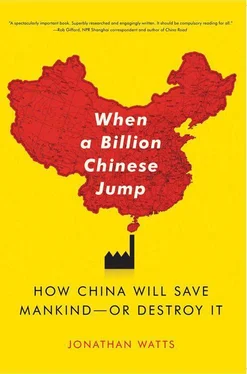Given the low priority the Chinese coal industry places on ecological and health concerns, it is little surprise that safety standards are also appalling. The country’s collieries are the most dangerous in the world. Since the start of economic reforms, the equivalent of an entire city of people has died underground. More than 170,000 miners have been killed in tunnel collapses, explosions, and floods, a death rate per ton at least thirty times higher than that in the United States. 12Countless more will perish prematurely of pneumoconiosis, also known as black lung disease, because there is little or no protection from the dust in the enclosed tunnels. Mine deaths are so frequent that if the Meng brothers had been less stubborn about surviving, the collapse at their pit could easily have gone unreported. All that is unique in their story is that they emerged to tell the tale. In many other cases, the bereaved have been silenced by mine bosses, censors, and local officials terrified that these underground horrors would come to light.
I saw that at Chenjiashan in Miaowan, a mining community in Shaanxi (distinguished from its neighboring province only by its extra “a”) and the scene of one of the worst mining accidents in recent memory, when 166 men were killed in a pit explosion. I was there to interview a group of the bereaved at the small brick home of one of the widows. Less than an hour after I arrived, a neighbor burst into the room with a warning: “Someone has snitched. The security men are coming. Shut the door, close the curtains, and stay quiet.” Moments later we heard footsteps outside, then a rap on the door. A mother squeezed her child tightly to her breast to muffle his cries. An older woman held back sobs, her eyes red with tears. Two others sat on a bed, exchanging anxious glances.
I was worried. By talking to a foreign journalist, these people could get in trouble. But I was angry too. The women were not subversives; they were widows and bereaved daughters. At small, unregistered mines, deaths went unreported because the owners, often in collusion with local officials, bought off or threatened the victims’ families. But this was a legal colliery. Why where the victims being treated in this way?
“It’s said there is blood on every piece of coal in China,” one of the widows had told me earlier. “My husband used to talk about the danger all the time. But we are very poor. We have children. What else could we do?”
The 800-meter-deep pit at Chenjiashan had a particularly bad reputation. Four years earlier, thirty-eight men had died there in a gas explosion. Five days before the latest accident a fire had broken out underground. “We came up, but the bosses told us to go back. We didn’t want to, but we had to,” said Li, a miner who had lost his brother in the explosion. “We all needed the money and there is a penalty of 100 yuan for refusing to go down.”
The managers, who had reportedly been promised a hefty bonus to increase production, ordered the men to keep working even though it had become hard to breathe underground. On the morning of the accident, Li had been preparing to start his shift when workers came running out of the shaft saying they had seen thick clouds of smoke. “Every miner knows that means there’s been an explosion,” he said.
Many widows said they could not hold a proper funeral. “Our husbands’ bodies are still underground,” said Mrs. Zhang. “But when we went to ask the mine supervisor for action, the security men beat us. One woman was hurt so badly she is still in hospital.”
I feared the same might happen again. As the footsteps crunched around the widow’s home, we tried to stay silent and pretend no one was in. But one of the children thought it was a game and yelled out loudly. The footsteps moved off, perhaps to call a superior. I had to leave quickly so these people would not be seen with me; so they could deny that we had met.
On our way back to the car we were quickly spotted and followed, first by one man, then three, then five. The goons kept their distance. None of them was of high enough rank to confront us. If we could get to the car before their superiors arrived, we might have been able to flee the village unimpeded. But the vehicle was locked. The driver had wandered off for a cigarette. We had no choice but to wait as a crowd gathered.
The police arrived. We were led away for interrogation. Whom had we been speaking to? What was our purpose? Why didn’t we get permission in advance from the authorities? Didn’t we know we had committed an offense? Four hours in detention. One of the junior officers came across as sympathetic. He asked the routine questions, but he did not push to find out which villagers we had spoken to. Perhaps he was a local man who did not want to get his neighbors into trouble. Perhaps he already knew who had been talking.
We were led off to a meet a foreign affairs official. More questions. I asked them why they were treating the victims as criminals, while those responsible for more than a hundred deaths were still free. It was dark by the time we were let out. The officials were getting hungry. They couldn’t find anything to charge us with and keeping us longer was not worth a missed dinner. 13
The high death rate was a simple matter of economics. Life in China was cheap, while coal was increasingly dear. In calculating compensation for the victims of the Chenjiashan blast, the state estimated the value of a miner’s life at 51,000 yuan (around $7,300). An extra 20,000 yuan was paid as a widow’s allowance and another 20,000 yuan for an unrecovered body. By contrast, mine operators were reportedly promised a 400,000 yuan bonus if they could raise output by 400,000 tons in the last two months of the year. The math was brutal. They could afford at least three deaths and still come out with a profit. There were no reports of punishments for any of the mine operators who forced their men into a burning pit.
Soul-destroying materialism is the theme of Blind Shaft, one of the darkest and strongest Chinese films of the past ten years. It tells the tale of two migrant miners who literally make a killing from unsafe illegal collieries. From the descent down the mine in the opening scene to the final shot, the director Li Yang presents an unrelentingly bleak view of how humanity is debased by the dark and narrow physical and moral environment. The central characters, Tang and Song, cheat their way from pit to pit, murdering fellow miners and then claiming to be family members so they can demand hush money from the colliery bosses.
Their cash is blown on school fees for their kids and hookers in a country where education is supposed to be free and prostitution illegal. In one scene they go whoring in a karaoke brothel, where they sing “Long Live Socialism.” The prostitute sneers at their backwardness and croons the same song with rewritten lyrics: “Americans are taking over China with their dollars.”
The con men befriend a naïve sixteen-year-old boy whom they line up as their next victim. Song has qualms about killing the teenager. To delay the day of reckoning he tells his partner the boy must have his first drink of baijiu, smoke his first cigarette, and lose his virginity before he can be killed. But such glimpses of humanity disappear when they return to the pit.
Coal and money degrade the characters and the land. Li bribed colliery bosses to let him film in real mines in Shanxi and Hebei. On the surface, the dusty, windswept landscape is unfailingly devoid of life and color. It is the setting for a moral apocalypse. If humans are to survive here, they must sacrifice their humanity.
Blind Shaft was banned in China. This was not the glory of modern development the government wanted people to see.
But the country was trying to clean up its mines and its skies. Linfen, the model of so much that was wrong, was in the front line of the charge. On the orders of the central government, it was closing down small, illegal collieries and the worst-polluting factories. I dropped in at the city’s environment bureau to ask whether these measures were working. The director, Yang Zhaofen, had progress to report. Of a sort. “Linfen is no longer the most polluted city in China,” he announced proudly. “It is the second worst.” 14The city had dropped below Urumqi, but I wasn’t sure if this was because Linfen was getting better or Urumqi worse.
Читать дальше










